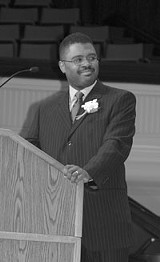Wade Norwood: Q&A on crime
[
{
"name": "500x250 Ad",
"insertPoint": "5",
"component": "15667920",
"parentWrapperClass": "",
"requiredCountToDisplay": "1"
}
]
City: What specific steps will you take within the police department to reduce crime?
Norwood: Number one, I believe that we need to reverse the reorganization and move to a structure that allows for more neighborhood connection between the police officers and the neighborhoods they patrol. Number two: We will increase state funding on a permanent basis to add 50 new police officers to the department, specifically assigned to deal with anti-drug efforts. Number three: In that reorganization I will make sure that we will deploy officers in a way that allows for an intense and visible street presence, including foot patrols in specific neighborhoods.
What specific steps will you take in other areas to reduce crime?
I that in partnership with the county government, we would be able to do a better job of providing assessment and after-care services for inmates in the county jail system --- so that inmates with emotional and physical health or employment problems, we are able to shut down the revolving door that all too often is our criminal justice system.
Second: I would partner with the county government to have a real, comprehensive approach to juvenile-justice services, so that we are able to intervene in the lives of young offenders earlier and in a way that allows for a restorative approach and a diversion approach. This is what I mean when I talk about the development of a real Marshall Plan for each neighborhood, to really get at those non-criminal justice issues in a comprehensive holistic way.
Do we need more police officers? If so, how many?
I believe that we do, and I have been saying that I would like to add 50 new members to the police department.
How will you pay for it?
Well, if you ballpark at $100,000 per officer, it gives us our amount. We should seek that financing from New York state government, and our highest priority needs to be going to Albany and getting an adjustment, a special aid line that allows for the hiring for these police funded by new dollars on a permanent basis.
Do we have enough information to abandon the new reorganization of the police department? If so, how should we organize the department?
Yes. I believe at least we should be moving back to one section in each quadrant, but I would be willing to rely on the expertise of our law-enforcement community to tell us what is the right configuration. But it is clear to a layperson when an experiment has worked and when an experiment has not worked, and this experiment has not worked.
Number one, if we look at the familiarity and the knowledge that the officer responding to a crime has of the neighborhood and the actors in the neighborhood, it's less than before. Number two, it now takes longer for crime reports to be picked up from the street level, gotten into central crime analysis, have trends interpreted, and then be reported back to the police officer on the street. Number three, I think that response time from the constant --- the moment that the 911 call is placed until the call is answered --- has not improved. In fact, I believe it has worsened. And lastly, customer satisfaction and the response of our employees --- this is not a subjective measure; it's a quantifiable measure --- in both cases, people say things have gotten worse.
How would you measure success in public safety?
I believe the overall crime rate is the most effective measure, not just crime in one category, but crime in all categories. But my two bottom lines are the economic well being measured in per capita income and the viability of neighborhoods measured in property values. I believe that as we tackle these issues, as we build the strength of neighborhoods, as we restore relationships within neighborhoods, we will se the real world value of that by having all of our neighborhoods being neighborhoods of choice, all of our neighborhoods being neighborhoods that are in such demand that property values increase.









